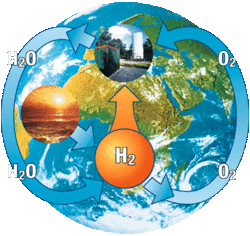The approach of every great crisis results first in a non-solution solution.
So it is with the War Against Oil. The energy bill passed by the Senate on June 21 is a non-solution solution.
Compared with the enormity of the economic and ecological crisis facing the U.S. and the world, the provisions in this bill are nothing. A rise in fuel economy standards which high gas prices would guarantee anyway. Provisions aimed at holding down oil prices when we should have guarantees they will stay high. Subsidies for ethanol, the ultimate non-solution solution.
The effort to transfer tax breaks from oil to renewable fuels was beaten, but the definition was wrong anyway. We don’t need "renewable" fuels. We need an entirely new energy ecosystem, built around hydrogen rather than carbon.
Democrats think they did something because they fought back Republican opposition, but in fact even the boldest Democrats on this issue were speaking from weakness. History will record this as the Hawley-Smoot Tariff act of its time. If, like most Americans, your U.S. history class barely touched the 20th century (because it would have to get into controversial subjects), then think of it as a latter-day Kansas-Nebraska Act.
It doesn’t matter to me whether President Bush signs or vetoes this mess. It does not address the problem, let alone address it in its proper magnitude.
Until we recognize the enemy for what it is — the carbon fuel cycle — and recognize the solution for what it is — a hydrogen fuel cycle — then we have not yet begun to fight.
It’s embarrassing that leaders with a Clue, like Al Gore, weren’t heard on this. Perhaps they feel that a little is worth more than nothing. When the problem is 1,000, and you offer 2, then the difference between little and nothing is very little. That’s the case here.
Here’s what a real War Against Oil bill would consist of:
- A Manhattan Project for more efficient solar panels and fuel cells. The results of the research to be shared among all U.S. companies, and licensed to any foreign company which wants to do its part in paying for the research.
- A price floor guaranteeing that those who bring renewable solutions to the market will find a profit, so long as they keep their costs reasonable.
- An end to subsidies for all carbon energy, including oil, gas, and ethanol.
- A crash conservation program, which uses patriotism to limit short-term demand for fuel.
Nothing like this was even proposed so I didn’t follow the debate very closely. It will take some major disasters, hurricanes and drought and supply disruptions on an epic scale, before we see real solutions. We need to get mad, we need to be united, and we need to all be focused on the same goal. We need to be as angry at the oil power as we were angry at Japan on December 8, 1941, as angry as we were against one another in 1861.
This bill was crap.












The crash conservation program is hardly needed alongside the price floor. Anyway, I’d rather see the focus be efficiency instead of curtailed use. Rather than say you can only use 1 gallon of gas per day, why not say you can use as much gas as you want but your car must get > 50 mpg. Controlling behavior is largely a fools errand. If you don’t watch out, your War on Oil will turn into something akin to The War on Drugs.
The crash conservation program is hardly needed alongside the price floor. Anyway, I’d rather see the focus be efficiency instead of curtailed use. Rather than say you can only use 1 gallon of gas per day, why not say you can use as much gas as you want but your car must get > 50 mpg. Controlling behavior is largely a fools errand. If you don’t watch out, your War on Oil will turn into something akin to The War on Drugs.